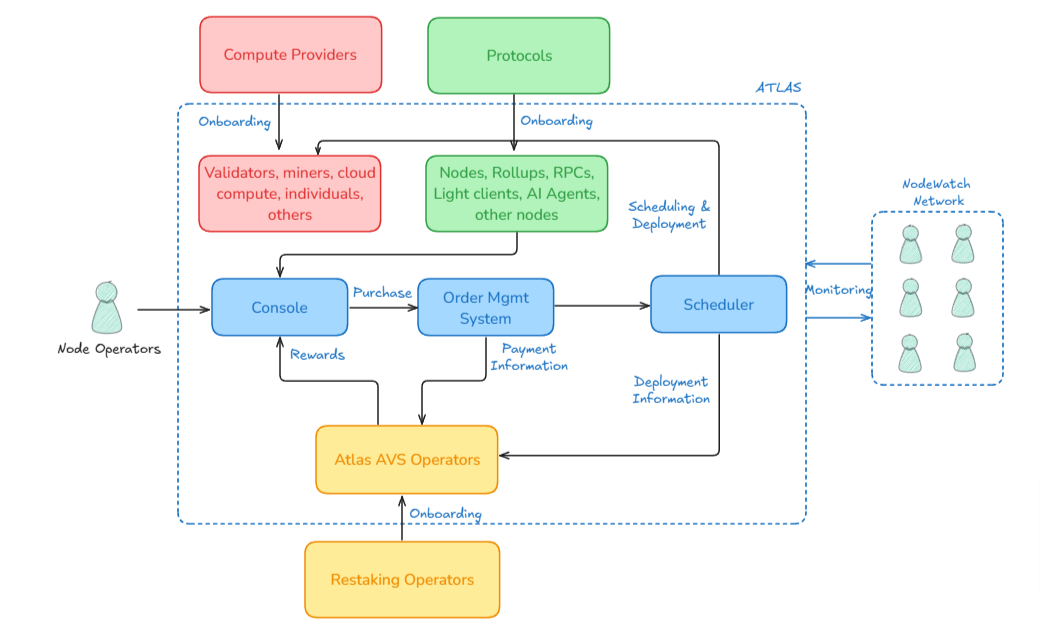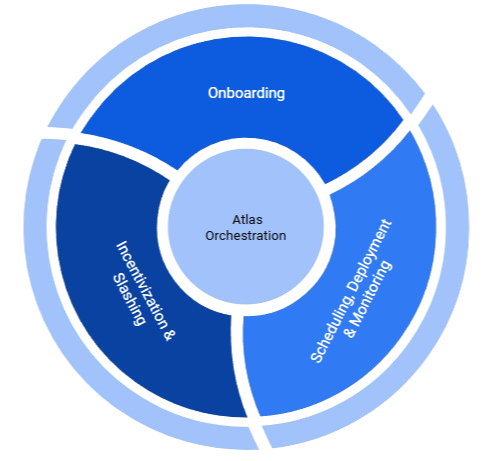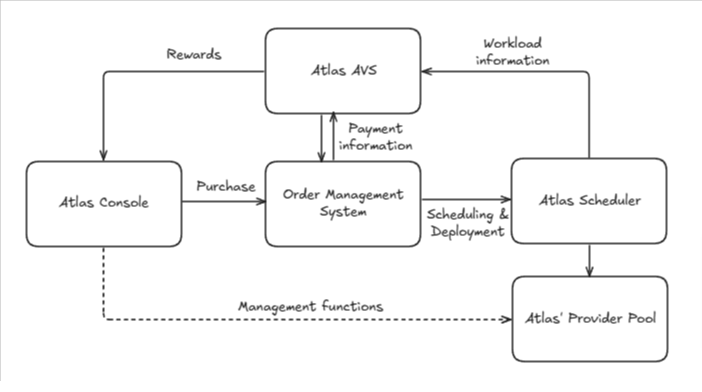Core Concepts
Overview
To build a strong and fully functioning network for node deployments requires focus on several important aspects:
- How do Providers onboard Atlas Network?
- How do restaking Operators onboard Atlas Network?
- How do node deployment get matched to available providers?
- How are the protocol participants incentivized and rewarded?
- How is the network kept reliable?
Atlas Network brings four different types of protocol participants under one roof and orchestrates various tasks between them in order to keep the network active, secure, reliable, and honest.
These are:
- Compute Providers: Individuals or groups that provide the compute infrastructure
- Restaking Operators: Existing operators on various restaking platforms
- Node Operators: Individuals using Atlas Network to deploy their nodes
- NodeWatch Network: Individuals or groups running the NodeWatch light client

Orchestration within Atlas Network
All the individual tasks required to be performed in order to answer the above questions need coordination between the different participants, and this is where the orchestration element comes into play.
In Atlas Network, all these tasks have been grouped together into several core functions:

Onboarding: Onboarding contains the set of tasks required for onboarding new protocols interested in bootstrapping a node network, compute Providers looking to use or reuse their compute infrastructure, and restaking operators willing to provide additional economic security to these node networks.
Scheduling and Deployment: These are the set of tasks related to finding the optimal compute for a node and performing the deployment. Atlas Network will have a custom logic to select a compute from the pool for every node deployment based on certain parameters, such as CPU, RAM, and disk space.
Monitoring: Every compute will be constantly monitored for its uptime, CPU, memory, and disk utilization. In addition, the state of each compute with respect to its hardware configuration will also be monitored to ensure any changes are captured.
Incentivization and Slashing: The tasks in this category pertain to rewarding the honest behavior of the participants, punishing any misadventure attempt, and ensuring a sustainable economy. Atlas Network has a dual incentive model with rewards in USDC as well as $NODE.
Atlas Network AVS
The Atlas Network AVS on EigenLayer plays a crucial role within the Atlas Network Network in performing on-chain verification of certain crucial tasks. A group of third party Operators registered with the Atlas Network AVS are responsible for performing these tasks.
Details to come soon.
Deployment Lifecycle
The deployment lifecycle in Atlas Network is a structured process encompassing several vital stages.

It begins with a node operator's request for node deployment via the Marketplace and progresses through various states. The network's smart contracts facilitate each step, ensuring a transparent, secure, and efficient pathway from request to resource allocation.
Payment Processing:
The first step in the node deployment process is payment processing, which starts the moment a node operator selects a node and proceeds to buy a subscription. Every new subscription is a new order processed through an Order Management System. Upon payment processing, a record is created within the Atlas Network backend, and the payment verification AVS task kicks in. The Atlas Network AVS operators perform verification on the subscription payment and once approved, the node deployment is ready to be scheduled.
Scheduling:
Scheduling refers to selecting the most appropriate machine for a deployment. The Atlas Network scheduler uses a scheduling logic to choose the best available machine based on different parameters for every deployment task. For details, please refer to Node Scheduling and Deployment.
Deployment:
Once the machine is confirmed, the scheduler performs the deployment on that machine. For details, please refer to Node Scheduling and Deployment.
Rewards:
The reward calculation process runs automatically every 24 hours. Each provider is rewarded for being active in the pool as well as for any nodes running on their machines. Node Operators are also rewarded for every node they purchase and deploy using Atlas Network Console, and the restaking operators are rewarded for every successful execution of AVS tasks. Rewards are covered in depth within the individual sections for each stakeholder.
The Atlas Network Console and Provider dashboard provides several functions that Node Operators and providers can use to monitor their nodes and machines. These functions form part of the operational management of these nodes and machines and provide critical information in the form of data points, charts, and graphs.